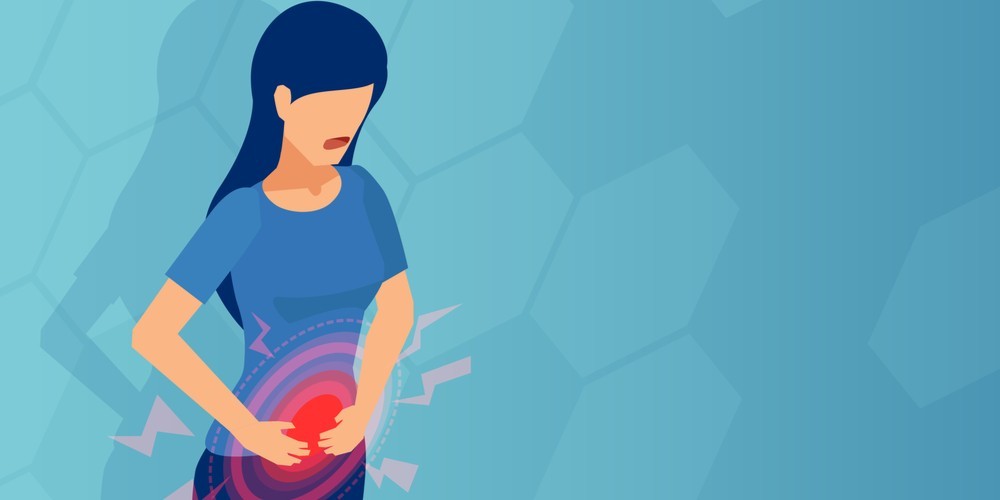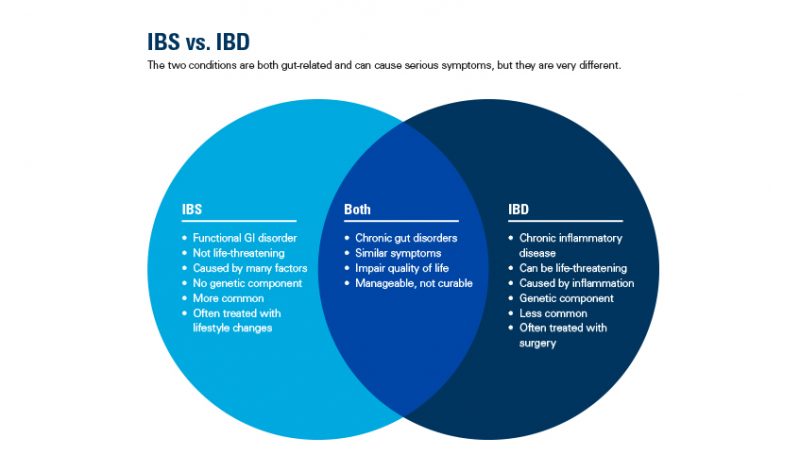
How are IBS and IBD different?
Irritable Bowel Syndrome (IBS) is a functional disease in which there is a group of symptoms without any underlying cause. The tests won’t reveal any explanation regarding these symptoms. In this condition, there is no major inflammation. This is a very common disease that only affects the colon.
Inflammatory Bowel Disease (IBD) is an inflammatory condition that can occur in the large and small intestines. This is a broader category that begins from the mouth and extends through the intestines to the anus. The two most common types of IBD are-
- Ulcerative colitis (UC) is an IBD that causes inflammation of the colon and rectum.
- Crohn’s disease is one IBD that can affect any part of the gastrointestinal tract or GI tract. But this generally affects the small intestine. There is no certain reason that can explain what causes an IBD. A possible explanation could be a problem with the immune system. Some doctors even believe IBD can be hereditary. So in such cases, genetics can be a factor. Surprisingly, smoking is another factor that increases the risk of an IBD.

Table of Contents
The difference in symptoms between IBS and IBD
It is common for people to get confused between IBS and IBD. This is simply because of the similar symptoms people experience when they either suffer from IBS or IBD. Some of the common symptoms that occur both in an IBS and IBD-
- Pain in the abdomen
- Diarrhoea
- Cramps in the abdomen
- Nausea and/or
- A sudden urge to go to the bathroom
But then how doctors differentiate between the two? They look for the symptoms that are unique to each condition.
Unique symptoms of IBS are-
- A feeling of incomplete evacuation
- Pain across the entire abdomen but especially in the lower right/left side.
- Causes loose stools
- More volume than the normal
- Abdominal bloating
- White mucus in the stools
- Frequent urge to urinate
- A pain syndrome characterized by chronic pain, fatigue and tender to touch known as fibromyalgia
IBS people with diarrhea as the primary symptom is known to have IBS-D while IBS people with constipation as the primary symptom is known to have IBS-C.
Also Read: Lifestyle Changes to Prevent Constipation?
Unique Symptoms of IBD-
The symptoms of IBD are far more serious. In addition to being more severe and serious, they can vary from individual to individual depending on the site and grade of inflammation. People with IBD tend to experience flare-ups i.e. the symptoms can just worsen suddenly or there are no or few symptoms at all. They come and just go in cycles. Some of them are-
- Anemia
- Redness or pain in the eyes
- A feeling of tiredness
- Fever
- Pain in the joint
- Changes in the skin
- Sudden weight loss
- Loss of appetite
- Bleeding from the rectum and anus
The difference in causes between IBS and IBD
There are no definitive causes that can explain inflammation in IBS. But some people believe possible explanations could be hyperactivity, bacterial gut infections, abnormal movement of contents through the GI tract or abnormal bowel contractions. This could be either due to certain foods, stress, infections, and hormonal changes. Depression and anxiety can also increase the risk of developing IBS.
For IBD, doctors are unable to figure out the reason behind an IBD. But people believe it to be an issue with the immunity system. IBD tends to run in families. Hence, genetics can also be a factor.
Also Read: Know Everything about Bowel Obstruction
The difference in treatment between IBS and IBD
The diagnosis of IBS and IBD are also different. There are no specific tests for IBS. doctors just ask bout the type and frequency of bowel movements and the consistency of the stools. Apart from that, he will review the symptoms and the patient’s medical history.
In addition to the above diagnoses, the doctor recommends any of the following for diagnosing an IBD-
- An X-ray or CT scan creates an image of the inside of the body.
- Endoscopy in which the doctor inserts a special device with a camera to see any complications.
- Similar to the endoscope, colonoscopy involves inserting an endoscope into the rectum and colon.
- Tests such as blood tests or stool tests are recommended to rule out other conditions.
Treatment for IBS-
Doctors recommend people with IBS to change their diet. Although there is no specific diet that works, you can try the following-
- Eat from fiber either through food or supplements (Also Read: Nutrition Health – To Get Rid of Piles & Constipation!!)
- Avoid lactose which is generally found in dairy products
- Limit foods that cause gas or bloating (Also Read: Home Remedy for Gas or Bloating)
- Drink as much water as possible
- Avoid caffeinated drinks as well as legumes
- Take prescribed drugs to get relief from diarrhea or constipation
- Try stress management, acupuncture, hypnotherapy, and relaxation training
On the other hand, IBD is treated with drugs that work on the inflammation that causes symptoms. Some of the inflammatory drugs administered are-
- Aminosalicylates
- Corticosteroids
- Immune system suppressors- azathioprine, cyclosporine, and methotrexate
- Antibiotics like metronidazole and ciprofloxacin
An IBD diet aims at reducing any bowel problems that can be aggravated by food.
- Limit dairy products
- Consume low fat
- Avoid high-fiber foods
- Avoid spicy foods, alcohol, and caffeine
- Eat smaller quantities
- Drink lots of water
- Take multivitamins
When the condition gets complicated, then doctors prescribe surgery. In this surgery, the surgeon removes the large intestine and rectum. Also, the doctor attaches a bag to the end of the small intestine to empty the bowels. The complications of ulcerative colitis require emergency help such as severe bleeding or tears in the colon.















